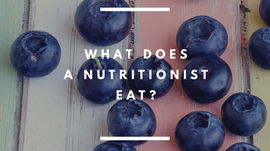Nutrition tips for GLOWING SKIN
- Karolina Lukaszewicz
- Nov 22, 2016
- 3 min read
Our skin is the largest organ of the body, so it is important to take care of it, not only from the outside, but also from the inside. Whilst topical skincare products help to improve its appearance, the food that you’re eating can have a great impact on your skin’s health. The beautiful skin starts with the nourishment from within…
A balanced diet will prevent skin conditions and keep it soft, supple and blemish-free. Your skin naturally reflects your body's internal needs, and if your diet is lacking key vitamins, it is likely that your skin will start to show this, by discolourations, dryness and spots.
The key nutrients for healthy skin include:
ANTIOXIDANTS help to protect skin from the cellular damage caused by free radicals. Eat a rainbow of colourful fruit and vegetables and aim for 7-a-day (5 veggies, 2 fruits), as well as a variety of nuts & seeds and a good quality protein. Zinc, Selenium, and vitamins A, C and E are fantastic antioxidants, particularly important for skin health. Where to find them? Sources listed in descending order of the nutrient concentration:
Zinc - Fresh oysters, Ginger root, Lamb chops, Pecans, Brazil nuts, Egg yolk, Oats, Almonds, Walnuts, Sardines, Chicken, Hazelnuts, Anchovies, Tuna, Haddock, Green peas, Turnips;
Selenium - Butter, Smoked herring, Brazil nuts, Apple cider vinegar, Lobster, Red Swiss chard, Oats, Oysters, Cod, Brown rice, Lamb, Turnips, Molasses;
Vitamin A - Red chilli peppers, Chicken liver, Dandelion greens, Carrots, Dried apricots, Collard greens, Kale, Sweet potatoes, Parsley, Spinach, Turnip greens, Mustard greens, Swiss chard, Beet greens, Chives, Butternut squash, Watercress, Mangoes;
Vitamin C - Red bell peppers, Kale leaves, Parsley, Collard leaves, Turnip greens, Broccoli, Brussel sprouts, Watercress, Cauliflower, Persimmons, Red cabbage, Strawberries, Papayas, Spinach, Oranges, Lemon juice, Grapefruits, Elderberries;
Vitamin E - Sunflower seeds, Almonds, Sesame oil, Olive oil, Butter, Spinach, Avocado, Oats, Asparagus, Salmon, Brown rice, Pecans, Carrots.
OMEGA 3 FATTY ACIDS, are essential fatty acids, meaning that they cannot be made in the body and must be obtained through the diet. Omega-3 fatty acids not only help to reinforce the cell membrane, but also reduce the body’s production of inflammatory compounds, involved in the ageing process. For younger looking skin and improvement of inflammatory skin conditions, such as acne, eczema or psoriasis, eat foods rich in omega-3, such as oily fish (remember acronym SMASH: Salmon, Mackerel, Anchovies, Sardines, Herring), flaxseeds, chia seeds, walnuts.
Foods supporting COLLAGEN production. Collagen is one of the most important proteins that makes our skin elastic, supple and youthful. With increasing age, our body’s collagen production slows down, which increases the chance of wrinkles and fine lines. To improve collagen production, make sure to include the following in your diet: bone broth, which is literally cooked collagen, as well as a variety of colourful fruit and vegetables: dark green leafy vegetables, such as kale or spinach, red veggies and fruits (beetroots, tomatoes, red peppers, apples, cherries, strawberries, raspberries), oranges, lemons, cabbage, avocado… wait, it’s the rainbow again ;-)
HYDRATION is the key - skin needs moisture to stay flexible. Your skin is 64% of water and without adequate water intake, skin appears duller, and wrinkles and pores are more prominent. Drink six to eight 8-fl.-oz glasses of water or herbal teas per day.
SUGAR is the wrinkle monster! Sugar as well as other simple carbohydrates, such as white bread, cause your insulin levels to spike, which leads to inflammation in your body. Inflammation produces enzymes that break down the collagen and elastin, resulting in sagging skin and wrinkles. Try cutting out sugar from your diet for a week, and the results will be amazing!
















Comments